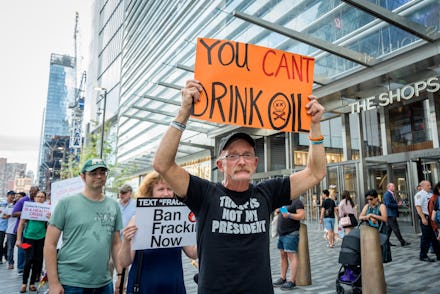The DNC's climate council is trying to force Joe Biden to the left

The Democratic National Committee's climate council has reignited plans to push presumptive Democratic presidential nominee Joe Biden to the left on climate issues. The panel, formally known as the DNC Council on Environment and Climate Crisis, was established in February after a years-long push by climate activists for a more rigorous policy platform on what most every candidate running in the Democratic primaries called the "greatest existential threat" of our time.
The Council on Environment and Climate Crisis released a proposal for the Democratic Party's platform, which will be voted on during this summer's convention. "Our nation and world face integrally related crises: the climate emergency, the COVID-19 pandemic, and an epic economic downturn," the plan begins, setting the context for the intersectional and justice-based principles that guide the 14-page document. "All this is taking place against the backdrop of decades of increasing racial and income inequality, the deterioration of our social safety net, and environmental and infrastructure degradation."
The plan, as indicated in its opening statement, covers a wide range of overlapping issues. The framework allows for elements of economic and environmental inequity to drive their recommendations, which largely draw on the Sunrise Movement's Green New Deal, legislation proposed in Congress by New York Rep. Alexandria Ocasio-Cortez (D) and championed by former Democratic presidential candidates Bernie Sanders and Elizabeth Warren, both senators.
Many of the demands outlined refer to climate gains that the Trump administration rolled back, such as reinstating vehicle fuel standards, re-banning exporting of crude oil, and re-entering the 2015 Paris climate agreement. Other demands go further than what Biden has outlined in his own campaign platform, including the call for a ban on fracking and for spending up to $16 trillion to tackle climate change. Biden has continued to position fracking as integral to U.S. energy independence and has proposed a $2 trillion economic plan to tackle climate change.
Despite Biden's reticence to take the climate action scientists say is necessary to save the planet, Michelle Deatrick, chair of the Council, told Politico that getting behind the plan won't hurt him. "This is good politics for Joe Biden and for the Democratic Party," Deatrick said. "Trump’s going to call Biden a lefty no matter what, right? So let’s energize our base, let’s energize the middle. Let’s do what’s right because the planet is at stake."
The plan calls for a 70% reduction in greenhouse gas emissions by 2035; for declaring a National Climate Emergency under the National Emergencies Act; for electrifying trucking, rail, and transit systems through greatly increased levels of public funding; and for divesting public funds, including pension funds and endowments, from fossil fuels and industrial agriculture and redirect resources to climate-safe investments.
The panel also outlines the need for a Just Transition, which is the principle that no person, worker, or community is left behind as the country shifts toward climate-centered policy. "The federal government should invest in projects that diversify and revitalize impacted tribal, state, and local economies," the plan reads, "in addition to making up local government revenue shortfalls resulting from the closing of extractive industries, paying for cleaning up legacy pollutants, and supporting the massive agriculture sector transition necessary due to the climate crisis."
According to Politico, Biden's campaign did not help to draft the plan, and it remains to be seen what the reaction from the camp will be. Biden's pinned his run on being a reasonable politician with reasonable liberal demands, and he also hired former Treasury Secretary Larry Summers as his national campaign adviser — a man who has long been opposed to taking action on climate change.
Even if Biden does end up supporting it, whether or not the plan goes into effect depends on what happens at the ballot box on the state level. In order to pass any legislation in 2021, a Biden administration would likely need a Democratic majority in the Senate.